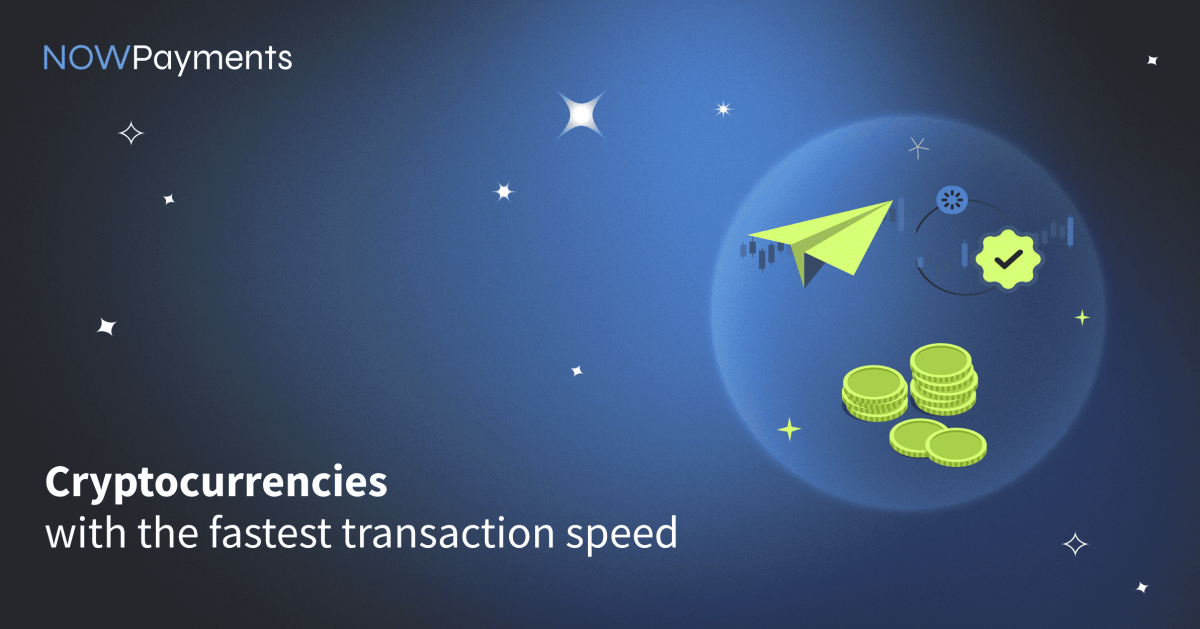In the evolving crypto landscape, fast transaction speed is crucial for scalability and efficiency. Efficient blockchain technology is essential for crypto payments, and many new networks have emerged to improve upon Bitcoin (BTC) and Ethereum (ETH). Platforms such as Solana (SOL) and Algorand (ALGO) are pushing the boundaries, enabling some of the fastest transaction speeds in the market.
Transaction speed, measured in transactions per second (TPS), is a vital factor in assessing blockchain performance. Platforms like NEAR Protocol, boasting up to 854 TPS, and Polygon, a highly optimized network, demonstrate how blockchains can achieve high transaction throughput for crypto transactions. Layer-2 protocols have also been developed to enhance transaction speeds further, improving the performance of popular networks like Ethereum. While Bitcoin processes about 7 TPS and Ethereum handles up to 25 TPS, other blockchains like NEAR, Solana, and Avalanche (AVAX) outperform them, reaching up to 65,000 TPS. This rapid transaction speed allows these networks to manage much larger volumes of transactions, making them some of the fastest cryptocurrencies and a top choice among the fastest blockchains. However, as transaction speeds improve, high transaction fees can sometimes surge, creating barriers for scalability. Innovative consensus mechanisms and blockchain speed optimization are key factors in increasing TPS. For instance, Solana employs Proof of History (PoH) to process transactions incredibly fast. Similarly, Waves and Stellar (XLM) use unique consensus systems that enable them to offer some of the fastest crypto transactions, maintaining their status as efficient transaction processing networks.
A top-rated cryptocurrency on our list is Solana (SOL) because it boasts the fastest transaction speeds in the world, achieving over 65,000 transactions per second (tps). This high transaction throughput is made possible by its innovative blockchain technology, which enables efficient transaction processing by allowing multiple parallel transactions. Compared to Bitcoin and Ethereum, Solana offers significantly lower transaction fees and faster transaction confirmation times, making it a preferred choice for users seeking quick and scalable solutions for digital payments. As we look ahead to 2025, Solana’s ability to handle high volumes of transactions positions it as a leading contender among the fastest blockchains, ensuring it remains a top player in the crypto market.
The blockchain world continues to evolve rapidly, with an increasing number of projects focused on improving transaction throughput. These innovations are crucial for the growing demands of crypto payments, decentralized finance (DeFi), and NFTs, ensuring that cryptocurrencies with the highest transaction speeds become more accessible to users and developers alike. As the demand for faster crypto transactions rises, projects like Waves, XLM, and others are setting the stage for a future where low-cost solutions and higher transaction throughput are the standard.
With that in mind, here’s a look at some of the fastest crypto blockchains leading the charge:
- Solana (SOL)
- Hedera (HBAR)
- Cosmos (ATOM)
- Neo (NEO)
- Avalanche (AVAX)
- EOS (EOS)
- Algorand (ALGO)
- Nano (XNO)
- Stellar (XLM)
- Waves (WAVES)
- Ripple (XRP)
| Coin | Max TPS | Avg Tx Time (s) | Consensus Type |
| Solana (SOL) | 65000 | 2.5 | Proof of History |
| Hedera (HBAR) | 10000 | 4.0 | Hashgraph |
| Cosmos (ATOM) | 10000 | 45.0 | Tendermint |
| Neo (NEO) | 10000 | 15.0 | dBFT |
| Avalanche (AVAX) | 5000 | 1.5 | Avalanche consensus |
| EOS (EOS) | 4000 | 1.5 | DPoS |
| Algorand (ALGO) | 1000 | 45.0 | Pure PoS |
| Nano (XNO) | 1000 | 0.14 | Block Lattice |
| Stellar (XLM) | 1000 | 15.0 | Stellar Consensus |
| Waves (WAVES) | 100 | 6.0 | LPoS |
| Ripple (XRP) | 1500 | 4.0 | Ripple Protocol |
Solana (SOL)
Solana (SOL) is recognized as one of the fastest cryptocurrencies, featuring an efficient blockchain platform tailored for decentralized applications (dApps) and high-performance crypto transactions. With a remarkable transaction speed of up to 65,000 transactions per second (TPS), Solana is a leading contender in the crypto space. This rapid speed allows businesses and developers to process transactions at unmatched rates, significantly enhancing user experience and scalability in crypto payments. Solana’s fast blockchain can handle numerous transactions, establishing a new standard for the fastest blockchain transactions per second. Whether for decentralized finance (DeFi), NFTs, or traditional payments, Solana has swiftly secured its position among the fastest cryptocurrencies in the market. Its emphasis on speed and low fees makes it an ideal choice for businesses aiming to seamlessly integrate crypto payments into their platforms.
Transaction Speed (TPS). Solana is celebrated for its high TPS capabilities, processing an extraordinary 65,000 transactions per second (TPS). This achievement positions Solana as the fastest blockchain in 2025 by TPS, surpassing many other prominent networks, including Ethereum and Bitcoin, which can only manage 25 and 7 TPS, respectively. The transaction speed of cryptocurrency on Solana is unparalleled, making it the fastest crypto network in terms of transaction volume and processing power. For developers and businesses, this efficiency allows for scaling without the concern of bottlenecks, making it a top choice for applications that demand fast crypto transfers and rapid processing.
Consensus Mechanism. Solana utilizes a distinctive consensus mechanism known as Proof of History (PoH), designed to enhance the scalability and speed of blockchain transactions. Unlike traditional proof-of-work or proof-of-stake systems, PoH timestamps each transaction to create a historical record that verifies that an event has occurred at a specific time. This enables Solana to achieve a fast blockchain with near-instant finality and the fastest crypto transactions compared to other networks. PoH, combined with Proof of Stake (PoS), significantly reduces the time needed to validate blocks, resulting in faster crypto transaction speeds and allowing Solana to consistently lead the crypto TPS rankings.
Transaction Costs. Solana is also recognized for its remarkably low transaction fees, making it one of the most cost-effective crypto payment gateways available. With fees often less than $0.01 per transaction, Solana ensures that both businesses and individuals can take advantage of its fast blockchain transaction speeds without the burden of high transaction costs. In contrast to platforms like Ethereum, which can impose high gas fees, Solana’s low-cost model encourages widespread adoption by minimizing the cost of crypto transactions. This makes Solana an appealing option for those seeking a fast crypto network with low transaction fees for both micropayments and large-scale transactions.
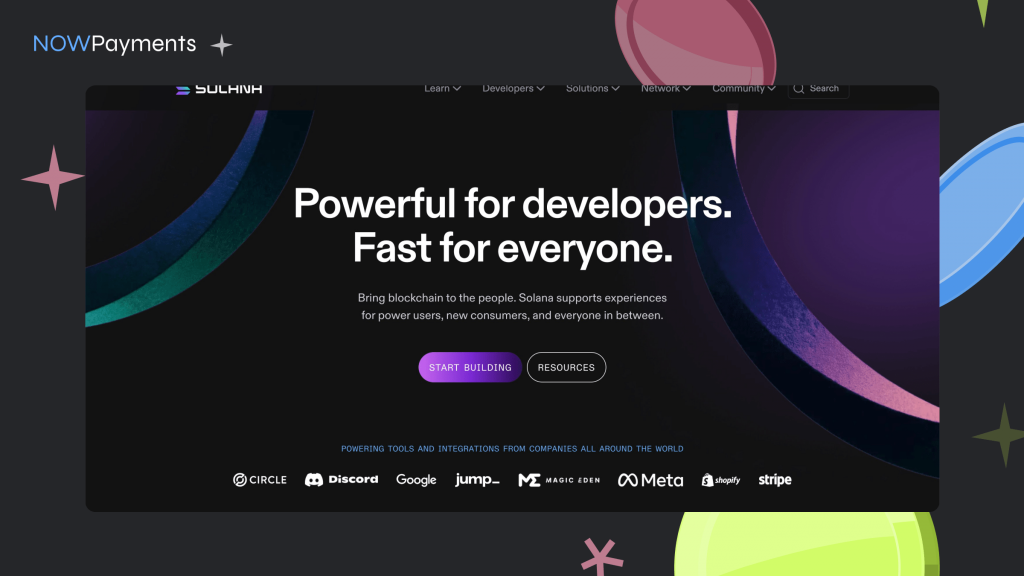
Hedera (HBAR)
Hedera (HBAR) is a fast cryptocurrency blockchain that provides a high-performance and scalable infrastructure for decentralized applications (dApps), payments, and enterprise solutions. Known for its fastest transaction speed, Hedera uses a unique consensus algorithm called Hashgraph, which allows it to process many transactions while maintaining high security and low latency. It is a key player in the fastest blockchain race for 2025, offering one of the fastest cryptocurrencies in terms of transaction speed and overall network efficiency. Hedera has emerged as one of the top 10 fastest blockchain options for businesses seeking rapid, secure, and cost-effective blockchain technology.
Transaction Speed (TPS). Hedera can handle up to 10,000 transactions per second (TPS), making it one of the fastest blockchains in the market today. This high TPS allows Hedera to stand out in the crypto TPS list, providing fast crypto transactions with minimal delays. Compared to other well-known networks like Bitcoin (7 TPS) or Ethereum (25 TPS), Hedera’s speed is unmatched, ensuring businesses can manage large transaction volumes without bottlenecks or slowdowns. This fast transaction time positions Hedera as a top choice for industries requiring quick transfer capabilities, such as finance and logistics.
Consensus Mechanism. Hedera uses the Hashgraph consensus mechanism, a revolutionary method that enables the fastest blockchain transaction speed while maintaining the security and decentralization of traditional blockchains. Unlike Proof of Work (PoW) or Proof of Stake (PoS), Hashgraph relies on an algorithm that organizes transactions in a directed acyclic graph (DAG), allowing multiple transactions to be processed simultaneously. This innovative mechanism contributes to Hedera’s high TPS and provides the fastest crypto transaction speed while ensuring quick block finality and low transaction costs. The transaction speeds of Hedera’s Hashgraph network make it ideal for applications that require both low latency and high throughput, such as real-time trading platforms and instant payments.
Transaction Costs. One of the standout features of Hedera is its low transaction fees, making it a cost-effective crypto for businesses looking to scale without high fees. Hedera charges significantly less than other blockchains like Ethereum, whose gas fees can fluctuate and become expensive, especially during high-demand periods. Hedera’s payment solutions ensure that users can execute thousands of transactions without incurring hefty fees, making it a fast blockchain with low costs that can cater to both microtransactions and large-scale enterprise needs. This makes Hedera particularly attractive to businesses seeking to minimize costs while still enjoying high transaction speeds.
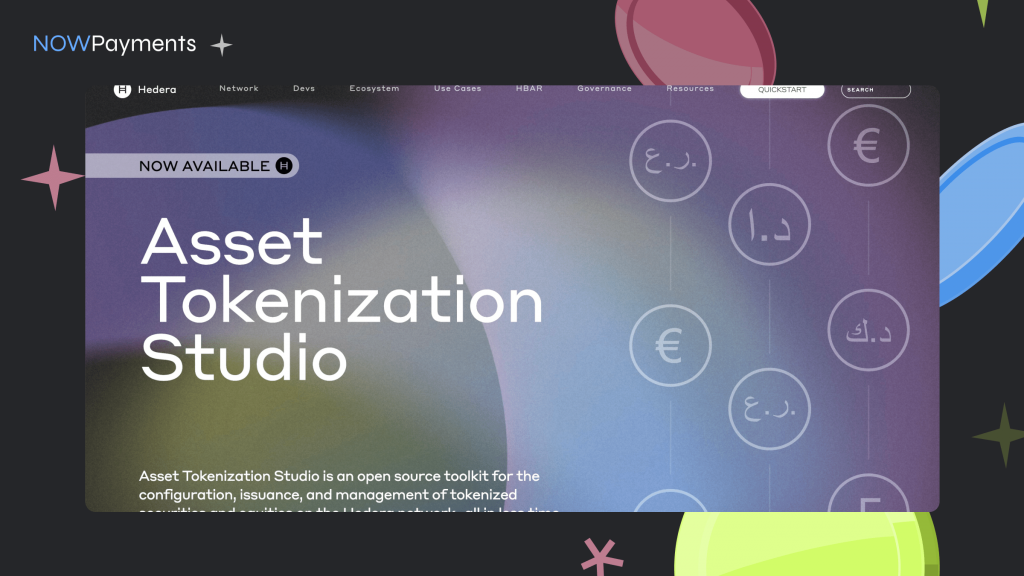
Cosmos (ATOM)
Cosmos (ATOM) is a fast cryptocurrency designed to solve the scalability issues of traditional blockchain networks. It connects various blockchains and supports fast crypto transactions, providing a seamless experience for decentralized applications (dApps) by enabling communication across different blockchain ecosystems. Cosmos aims to be one of the top 10 fastest blockchains, addressing the limitations of others by allowing them to work together without sacrificing speed or security.
Transaction Speed (TPS). Cosmos is known for its high transaction speeds, processing up to 10,000 transactions per second (TPS). This positions it as one of the fastest cryptocurrencies for transaction speed. With its high TPS capabilities, Cosmos scales efficiently, supporting large-scale dApps and making it an ideal choice for developers and enterprises needing cryptocurrencies with the highest transactions per second. This fast transaction speed ensures Cosmos can meet the growing demand for advanced blockchain technology, crucial for the expansion of decentralized finance (DeFi) and other blockchain-based services.
Consensus Mechanism. Cosmos utilizes the Tendermint consensus algorithm, a fast mechanism that ensures both security and scalability. Tendermint provides rapid transaction times by enabling instant finality, allowing for quick transaction confirmations. This mechanism ensures that transactions are processed swiftly while maintaining decentralization and security. With Tendermint, Cosmos achieves the fastest transaction times, making it a leading option for developers seeking a fast crypto platform with high scalability and low latency. It also supports TPS comparisons for various interconnected blockchains within the Cosmos ecosystem, ensuring optimal performance for all transactions.
Transaction Costs. Cosmos offers low transaction costs, making it a cost-effective solution for users and businesses. The network uses the Cosmos Hub to facilitate communication between different blockchains, reducing fees by improving transaction processing efficiency. These low fees are essential for fast crypto payments, as high costs can hinder blockchain adoption. Cosmos’s ability to provide fast transfers with low transaction fees makes it attractive for enterprises and users looking to scale operations without incurring high costs, especially beneficial for microtransactions or high-volume activities.

Neo (NEO)
Neo (NEO) is a fast cryptocurrency blockchain designed to support smart contracts and decentralized applications (dApps), similar to Ethereum but with a focus on scalability and efficiency. Often referred to as the “Ethereum of China,” Neo is recognized for its fastest crypto transaction speeds and its ability to handle high transaction throughput without compromising security. With its innovative approach to blockchain technology, Neo aims to become the foundational infrastructure for decentralized finance (DeFi) and other emerging technologies. Positioned as one of the fastest blockchains in terms of transactions per second (TPS), Neo stands out in the crypto TPS list for offering an ideal combination of speed, security, and scalability for businesses and developers.
Transaction Speed (TPS). Neo boasts an impressive transaction speed, capable of processing up to 10,000 transactions per second (TPS). This places Neo among the top 10 fastest blockchain networks regarding crypto transaction speeds. As one of the fastest cryptocurrencies available today, Neo is designed to cater to applications that require high-frequency transactions and real-time processing. Its potential for 2025 ensures that Neo can scale to meet the growing demands of decentralized applications, gaming, and other sectors needing fast crypto transfer solutions. Compared to blockchains like Ethereum and Bitcoin, which have slower transaction speeds, Neo offers a faster crypto network with instant transaction confirmation, providing a better user experience with minimal delays.
Consensus Mechanism. Neo operates on a unique consensus model known as Delegated Byzantine Fault Tolerance (dBFT), which allows for a more efficient and faster blockchain than traditional Proof of Work (PoW) and Proof of Stake (PoS) mechanisms. This consensus algorithm enables Neo to achieve high-speed crypto transactions while maintaining a high level of security and decentralization. dBFT ensures quick crypto transactions by allowing fewer validators to confirm blocks, significantly speeding up the process without compromising network integrity. Neo’s consensus mechanism is optimized for scalability, making it an ideal blockchain for high-performance decentralized applications focused on speed and efficiency.
Transaction Costs. Neo is known for its low transaction fees, making it a cost-effective option for developers and businesses looking to scale without worrying about rising gas fees. Compared to other fast crypto networks, Neo offers lower transaction costs, making it suitable for high-volume applications like payment systems, gaming, and DeFi projects. This is a significant advantage for users seeking the fastest crypto transfer solutions without the burden of high blockchain transaction fees often found on platforms like Ethereum. Neo’s cost-efficient approach, combined with its fast crypto transactions, provides businesses with a robust platform for building and deploying applications.
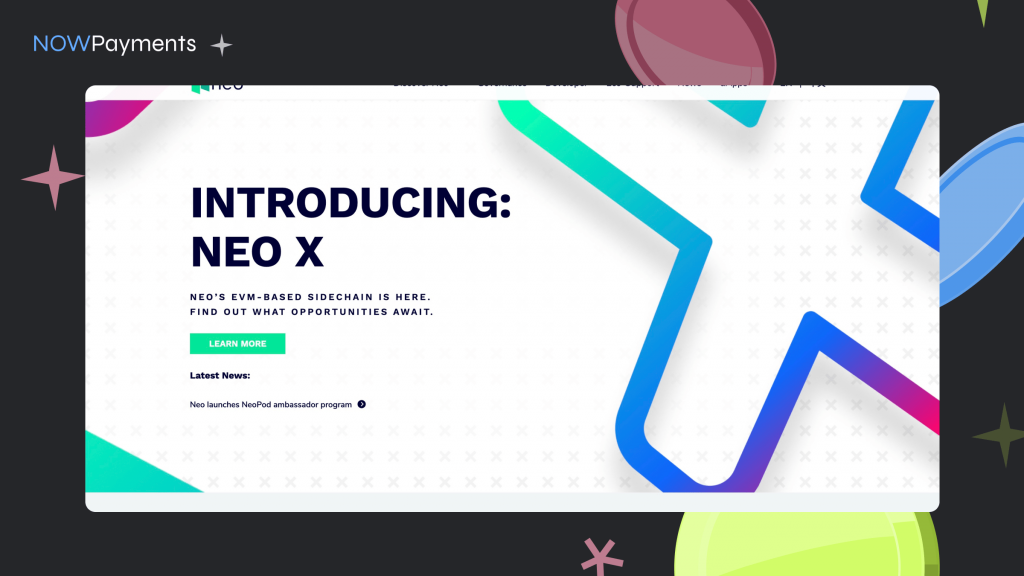
Avalanche (AVAX)
Avalanche (AVAX) is a fast crypto blockchain that has been designed to offer high performance and scalability, making it one of the fastest cryptocurrencies for decentralized applications (dApps), decentralized finance (DeFi), and enterprise-level blockchain solutions. Known for its fastest crypto transaction speed, Avalanche is capable of processing a large number of transactions without sacrificing security or decentralization. Positioned as one of the fastest blockchains 2025, Avalanche provides an ideal platform for developers seeking a fast blockchain that can support the growing demand for high-speed, low-cost transactions. With its unique architecture, it has quickly earned a spot in the top 10 fastest blockchain networks, providing a highly efficient solution for users across various industries.
Transaction Speed (TPS). Avalanche offers exceptional transaction speed, handling up to 6,500 transactions per second (TPS), which makes it one of the fastest blockchain transactions per second networks available. This puts Avalanche on the crypto tps list among the fastest cryptocurrencies in the market. Its ability to maintain such high crypto transaction speeds while ensuring low latency is crucial for applications like decentralized finance (DeFi), where quick transaction finality is essential. Avalanche’s ability to scale fast crypto transactions sets it apart as a fast blockchain solution for businesses and users requiring the fastest crypto transfer capabilities. With Avalanche transactions, users benefit from faster crypto transaction time compared to traditional blockchains like Ethereum, which can often face congestion and higher costs.
Consensus Mechanism. Avalanche employs a unique consensus mechanism known as Avalanche consensus, which is designed to provide high transaction throughput while maintaining decentralization. This consensus method achieves fastest crypto transaction speed by allowing for a high level of parallelism, enabling Avalanche to process transactions in a blockchain tercepat fashion, with instant finality. The Avalanche consensus ensures that transactions are confirmed almost immediately, significantly reducing delays seen in other blockchain networks. With its fastest blockchain approach, Avalanche can process thousands of transactions per second with low fees, making it a top contender for applications that demand the fastest crypto performance, such as real-time payments or high-frequency trading platforms.
Transaction Costs. Avalanche is also known for its low transaction costs, a key feature that sets it apart from many other high-speed blockchains. Unlike Ethereum, which can experience high gas fees during periods of congestion, Avalanche’s architecture ensures that transaction fees remain minimal, even during peak times. This makes it an ideal blockchain for both developers and businesses looking for fast crypto payment solutions without the financial burden of high fees. The low-cost crypto model of Avalanche also helps users manage costs effectively, especially when dealing with microtransactions or frequent transactions, making it a cost-effective crypto for large-scale operations. Its fast blockchain transactions at low cost ensure that users enjoy fastest crypto transfer without the risk of fees eating into profits.

EOS (EOS)
EOS is a fast cryptocurrency blockchain designed to support the creation of decentralized applications (dApps) and smart contracts at scale. Recognized for its fastest transaction speed, EOS can process thousands of transactions per second (TPS). It stands out as one of the fastest blockchain networks for decentralized applications, delivering a high-performance crypto network that efficiently handles high transaction throughput without compromising decentralization or security. As part of the fastest blockchains in 2025, EOS aims to be a significant player in the future of blockchain technology, providing effective crypto transaction speeds suitable for enterprise-level applications.
Transaction Speed (TPS). EOS features a high transaction speed, processing up to 4,000 transactions per second (TPS). This capability positions it among the fastest blockchains available, competing with other rapid crypto options like Solana and Avalanche. The quick transaction time of EOS ensures it can manage large-scale decentralized applications (dApps) and crypto payments with minimal delay, offering one of the fastest transaction rates per second. Its ability to handle such a high volume of transactions makes EOS a strong contender in the crypto TPS comparison, ideal for businesses requiring fast crypto transfers and low transaction costs.
Consensus Mechanism. EOS utilizes the Delegated Proof of Stake (DPoS) consensus mechanism, which enhances blockchain transaction speed by allowing a limited number of block producers to verify transactions. This DPoS approach results in faster block generation and transaction confirmation compared to traditional Proof of Work (PoW) blockchains like Bitcoin. The rapid consensus system supports high TPS and helps maintain low transaction latency while ensuring network decentralization. EOS’s DPoS model aims to achieve both scalability and security, providing one of the fastest blockchain experiences without sacrificing performance.
Transaction Costs. A key feature of EOS is its low transaction costs. Unlike other blockchain networks that experience high transaction fees during congestion, EOS eliminates fees for its users. Instead of paying for each transaction, users stake EOS tokens to access network resources, making it a cost-effective option for businesses and developers seeking fast crypto payment solutions. The zero-fee model ensures that transactions on the EOS network are efficient and economical, particularly beneficial for projects requiring frequent crypto transactions and fast transfer capabilities.
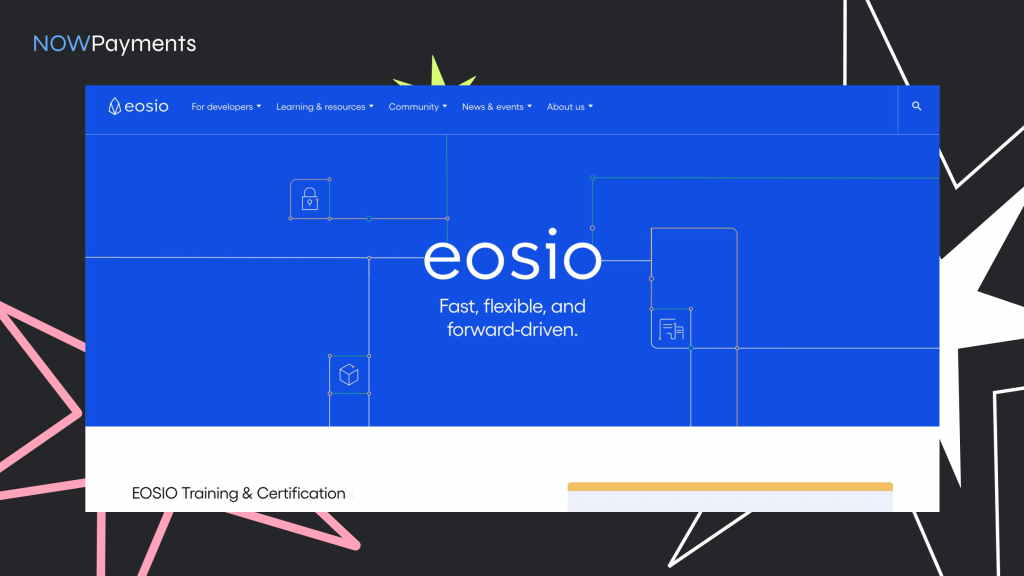
Algorand (ALGO)
Algorand is a blockchain platform designed to tackle the scalability and security challenges faced by traditional blockchain networks. Recognized for its impressive fast cryptocurrency transaction speed, Algorand offers a high-performance platform for decentralized applications (dApps), decentralized finance (DeFi), and digital assets. With its unique design, it provides rapid blockchain transactions and has established itself as a significant contender in the race for the fastest blockchain by 2025. By emphasizing speed, scalability, and decentralization, Algorand has secured a spot in the top 10 fastest blockchain networks, equipping developers and businesses with the tools to create efficient crypto payment solutions.
Transaction Speed (TPS). Algorand is famous for its high transaction throughput, capable of processing over 1,000 transactions per second (TPS). This positions it among the fastest cryptocurrencies and ranks it high on the crypto TPS list. Its rapid crypto transaction speed ensures that it can manage real-time payments, crypto transfer services, and decentralized finance applications without delays. In comparison to Ethereum (which can handle up to 25 TPS) or Bitcoin (with only 7 TPS), Algorand’s swift blockchain speeds make it an excellent choice for developers aiming to build high-performance applications in a swiftly evolving blockchain ecosystem. As one of the fastest blockchains, Algorand can efficiently scale to meet the demands of both enterprise and consumer-level applications.
Consensus Mechanism. Algorand employs a unique consensus mechanism known as Pure Proof of Stake (PPoS), which enables the network to achieve rapid crypto transaction speed and block confirmation within seconds. Unlike traditional Proof of Work (PoW) or Proof of Stake (PoS) models, PPoS ensures that transactions are processed quickly and securely without sacrificing decentralization. This fast blockchain technology guarantees that the system remains highly efficient and among the fastest by allowing thousands of transactions to be confirmed simultaneously, avoiding the delays seen in other consensus protocols. The PPoS model ensures that crypto transaction speeds stay high while providing a transparent and secure environment for decentralized applications and digital assets.
Transaction Costs. Algorand stands out due to its low transaction costs, making it an appealing choice for developers and businesses seeking cost-effective crypto payment solutions. Unlike networks like Ethereum, which often face high gas fees, particularly during times of congestion, Algorand’s model allows for rapid crypto payments with minimal fees. This low-cost feature is essential for applications requiring frequent transactions or microtransactions, making it an ideal platform for high-frequency trading, e-commerce, and DeFi applications. With its swift crypto transfer capabilities and low fees, Algorand is contributing to the adoption of blockchain technology in industries seeking scalability without high costs.
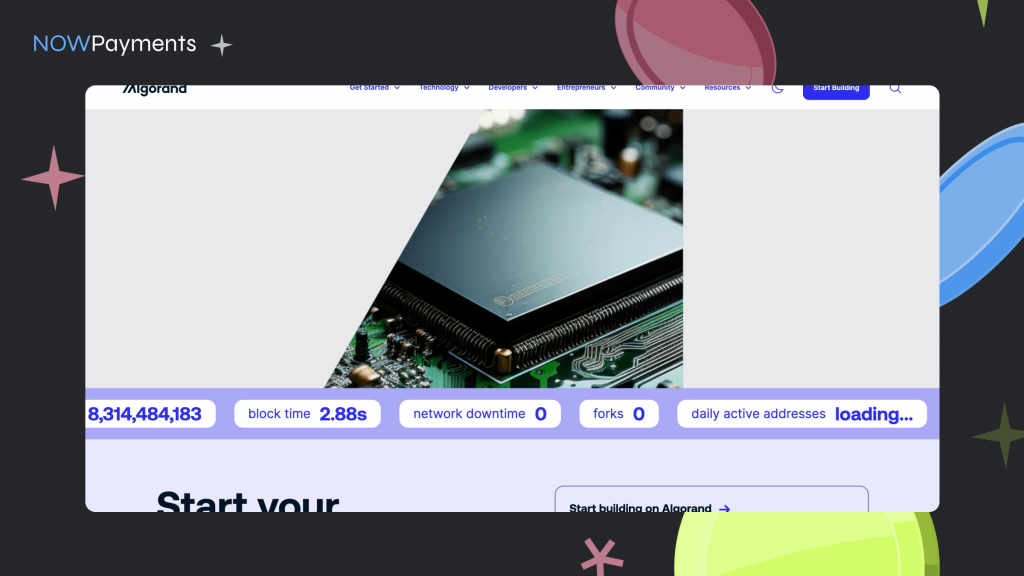
Nano (XNO)
Nano is a cryptocurrency designed for fast and feeless transactions. It utilizes a unique block lattice structure, allowing each account to operate on its own blockchain, which ensures quick and seamless crypto transactions. Nano is built to provide the fastest crypto transfer solutions, making it one of the fastest cryptocurrencies today. With a focus on low-cost and fast blockchain technology, Nano stands out by offering high transaction speeds without the delays or high fees associated with networks like Bitcoin or Ethereum.
Transaction Speed (TPS). Nano is recognized for its exceptional transaction speeds, capable of handling over 1,000 transactions per second (TPS). This positions Nano among the fastest blockchains, ensuring quick transaction times. Its block lattice design allows for rapid processing, making it one of the best options for real-time payments and crypto transfers. Compared to traditional blockchain networks, Nano not only offers fast transactions but also provides instant finality, making it one of the top 10 fastest blockchain solutions for those needing quick crypto transactions.
Consensus Mechanism. Nano employs the Open Representative Voting (ORV) consensus mechanism, which is different from traditional Proof of Work (PoW) or Proof of Stake (PoS) systems. This lightweight model enhances Nano’s blockchain performance by allowing representatives to vote on transactions instead of requiring global consensus across all nodes. This design minimizes overhead and ensures that transactions are confirmed at an ultra-fast rate. The ORV mechanism keeps the crypto transaction speed high while maintaining decentralization, positioning Nano as one of the fastest options for applications that require quick blockchain TPS comparisons.
Transaction Costs. One of Nano’s most appealing features is its zero transaction fees. Unlike other blockchain networks that often incur high gas fees (like Ethereum), Nano’s feeless structure makes it a cost-effective option, especially for microtransactions and frequent transfers. This makes Nano highly suitable for fast payment applications, where users can make transactions without worrying about high costs. The no-fee model is ideal for those seeking fast blockchain technology while avoiding the financial burdens of traditional networks.
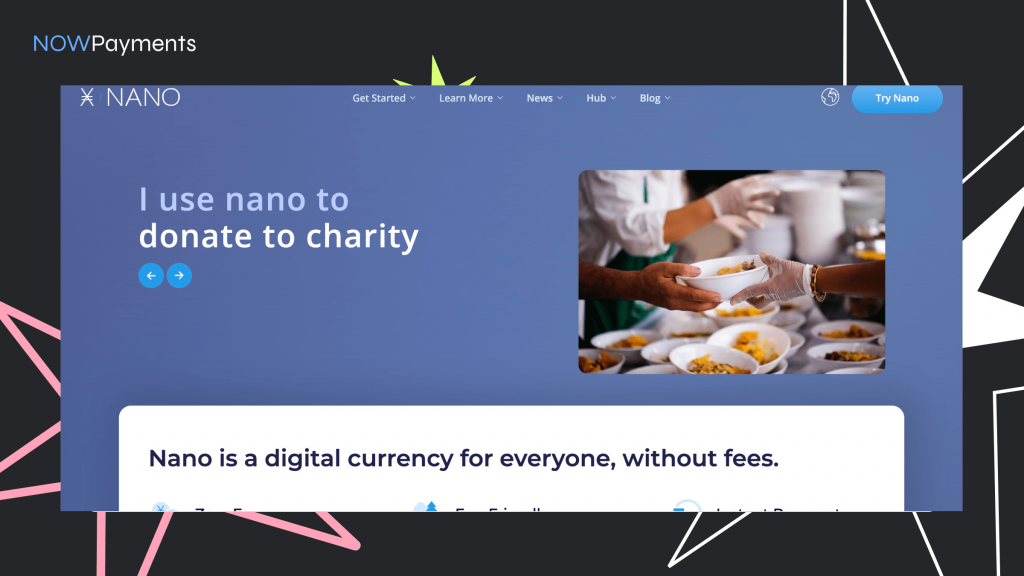
Stellar (XLM)
Stellar is a crypto blockchain designed to facilitate low-cost, high-speed transactions across borders. Known for its ability to handle large transaction volumes with ease, Stellar is considered one of the fastest cryptocurrencies for both cross-border payments and decentralized finance (DeFi). Its focus on interoperability makes Stellar an ideal choice for businesses and individuals seeking to conduct fast and secure transactions in a crypto fastest transaction time environment. As one of the fastest blockchain 2025 contenders, Stellar continues to innovate with crypto transfer solutions that prioritize fast crypto transactions and scalability.
Transaction Speed (TPS). Stellar is highly regarded for its high transaction throughput, capable of processing up to 1,000 transactions per second (TPS). This makes it one of the fastest blockchains in terms of transaction speed, and it ranks favorably on the crypto tps list. Stellar’s fastest crypto transaction speed ensures that transactions are processed quickly, which is essential for financial applications and cross-border payments. Whether you’re sending fast crypto between countries or using decentralized applications, Stellar’s ability to handle large transaction volumes makes it one of the fastest blockchain solutions available. Compared to other blockchains tercepat, Stellar offers impressive crypto transaction speeds, contributing to its reputation as a fast blockchain network.
Consensus Mechanism. Stellar uses the Stellar Consensus Protocol (SCP), which is unique compared to traditional Proof of Work (PoW) or Proof of Stake (PoS) models. SCP ensures fast blockchain transaction speed by allowing for quicker validation of transactions with low energy consumption. Instead of relying on miners or validators to perform computations, Stellar uses a federated Byzantine agreement mechanism, which significantly reduces delays in transaction finality. This consensus mechanism allows Stellar to offer faster crypto transaction speed and high transaction throughput, making it one of the fastest crypto networks available for global payments. With SCP, Stellar ensures both scalability and security, providing an efficient blockchain for crypto payments that is ideal for high-frequency applications.
Transaction Costs. One of the standout features of Stellar is its low transaction fees, making it one of the best crypto networks for cost-effective crypto transfers. Transaction fees on Stellar are incredibly low, often only costing a fraction of a cent. This fast crypto transfer cost structure makes Stellar a highly attractive option for sending money across borders without incurring high fees, a common problem with other blockchain networks like Bitcoin or Ethereum. This makes Stellar an ideal choice for businesses and financial institutions looking to scale while keeping transaction costs low. As a result, Stellar is known for its ability to provide a fast blockchain transaction speed with low fees, supporting the adoption of decentralized finance (DeFi) solutions.
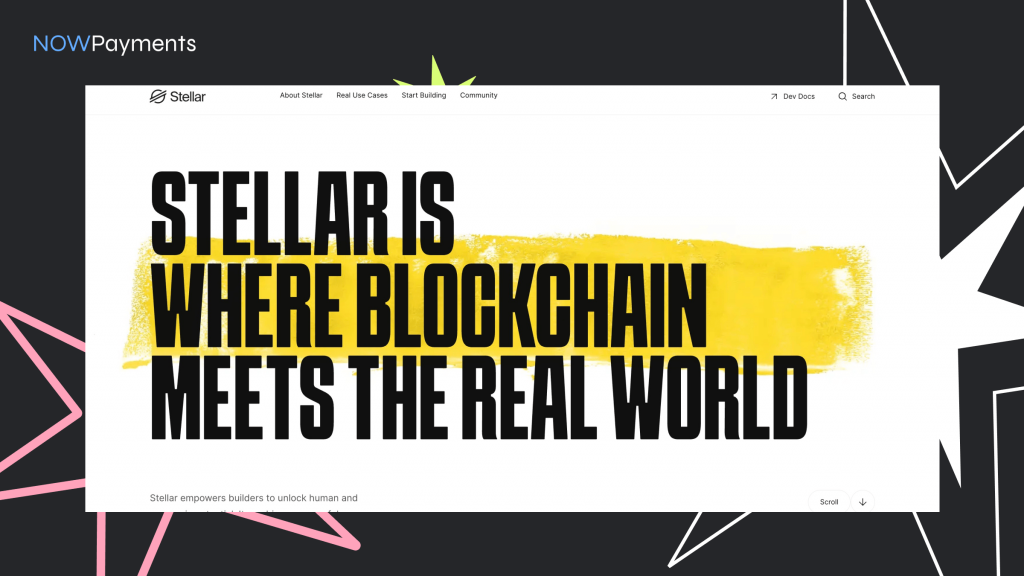
Waves (WAVES)
Waves is a blockchain network designed for the creation and management of digital assets, decentralized applications (dApps), and smart contracts. It aims to provide a fast blockchain solution that simplifies blockchain technology for businesses and developers. Known for its fastest crypto transaction speed, Waves enables fast crypto transfers at high throughput, making it one of the top 10 fastest blockchain networks. With an emphasis on scalability and low-cost transactions, Waves ensures that crypto transactions can be processed efficiently, whether for microtransactions or large-scale operations.
Transaction Speed (TPS). Waves is capable of processing up to 6,500 transactions per second (TPS), making it one of the fastest blockchain transactions per second available. This high TPS crypto performance ensures that Waves stands out as a fast crypto network capable of handling significant transaction volumes without delay. The ability to process fast crypto transactions in real time positions Waves as one of the fastest cryptocurrencies for decentralized applications, token transfers, and payments. With this fast blockchain speed, Waves provides crypto with the fastest transaction speed, making it ideal for industries that demand high throughput and minimal transaction time, such as DeFi and financial applications.
Consensus Mechanism. Waves uses the Leased Proof of Stake (LPoS) consensus mechanism, which combines the best aspects of Proof of Stake (PoS) and delegated voting to secure the network. The LPoS mechanism helps Waves achieve fastest crypto transaction speed by allowing for faster block generation and transaction validation, which leads to faster crypto payments and lower energy consumption compared to Proof of Work (PoW) networks like Bitcoin. This consensus system ensures that Waves remains one of the fastest blockchains while maintaining a decentralized network that is highly secure and scalable. The LPoS mechanism provides a balance of high transaction throughput with low network fees, supporting the platform’s goal to provide the fastest blockchain experience.
Transaction Costs. One of the key advantages of Waves is its low transaction fees. Compared to other blockchain networks with high gas fees, especially during periods of congestion, Waves offers an affordable way to execute fast crypto transactions. The network’s efficient design allows for minimal transaction costs, making it an attractive choice for developers and businesses looking to scale their blockchain-based applications without incurring significant fees. Waves provides an affordable crypto network for high-frequency crypto payments, which is particularly beneficial for users involved in microtransactions or businesses that require low-cost crypto solutions. This low-cost structure, combined with fastest crypto transfer capabilities, ensures that Waves remains a leading fast blockchain for a variety of use cases.
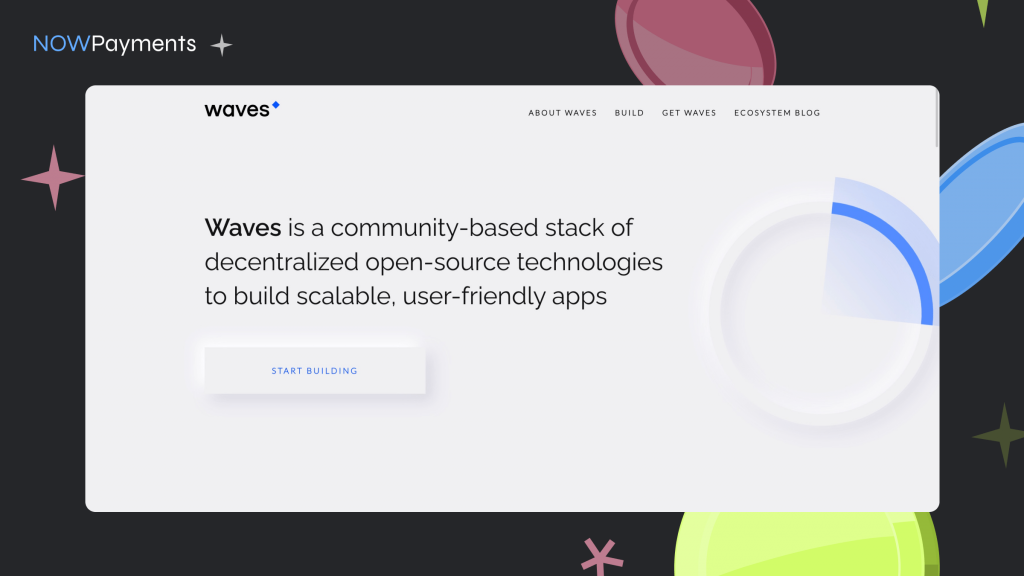
The future of сrypto payments
The future of crypto payments relies on increased transaction speeds and efficient transaction processing systems that can handle the growing demand for fast and low-cost transactions. In order for blockchain networks to achieve global adoption, they must be capable of confirming transactions and validating transactions quickly, surpassing traditional payment processors like Visa, which handles about 1,700 transactions per second (TPS). Blockchain networks must aim for higher transaction throughput, enabling faster transaction processing and higher transaction speeds to meet the needs of real-world applications.
As blockchain technology evolves, projects like Solana (SOL), Ripple (XRP), and Algorand (ALGO) have already surpassed the BTC network’s transaction speed, with Solana processing up to 65,000 TPS. This high transaction throughput allows them to provide efficient payment solutions and deliver faster crypto transactions for industries such as gaming, finance, and e-commerce. As the fastest crypto networks, these projects are paving the way for a future where cryptocurrency payments become mainstream.
However, slow transaction times still hinder broader adoption, especially for applications requiring high-speed transactions. To compete with Visa and other traditional networks, blockchains need to ensure transaction speed and low transaction fees remain in balance. Cryptocurrencies like Ripple focus on reducing transaction costs and settlement times, making it an ideal solution for cross-border payments. Meanwhile, Algorand has optimized its blockchain transaction speed with its Pure Proof-of-Stake (PPoS) mechanism, offering quick finality and scalable transaction throughput, making it suitable for frequent small-value transactions.
In this competitive landscape, the fastest blockchain transaction speed and higher throughput are crucial factors in determining a blockchain’s success. As crypto tps ranking evolves, we can expect faster transaction speeds and more efficient transaction processing to become the standard, bringing cryptocurrency payments to the forefront of global financial systems.
Why Transaction Speed and TPS Are Crucial for Fastest Blockchain Payments
Transaction speed and transactions per second (TPS) are critical factors in determining the efficiency and usability of blockchain payments. As the demand for digital currencies continues to rise, users are increasingly seeking solutions that can process transactions quickly and reliably. The fastest cryptocurrencies with the highest TPS are able to handle a large volume of transactions simultaneously, reducing wait times and enhancing the overall user experience. This capability is essential for various applications, from everyday purchases to complex smart contracts, as it allows for seamless interactions without the bottlenecks often associated with slower networks. Consequently, the pursuit of faster transaction speeds and higher TPS has become a key focus for blockchain developers and cryptocurrency projects aiming to compete in an evolving market.

Conclusion
The future of crypto payments is evolving rapidly, driven by the need for faster, more efficient blockchain networks. Projects like Solana, Ripple, and Algorand are setting the standard by offering some of the fastest crypto transaction speeds on the market, transforming how transactions are conducted in sectors like decentralized finance (DeFi), e-commerce, and beyond. These advancements are not just about faster crypto transfers but are helping shape the broader landscape of blockchain technology.
As demand for high TPS crypto transactions grows, NOWPayments emerges as the best crypto payment gateway. With its focus on speed, scalability, and ease of integration, NOWPayments is the perfect solution for businesses and individuals seeking to accept crypto payments seamlessly. Supporting over 300 cryptocurrencies, including high TPS blockchains like NEAR Protocol and Polygon, it offers unparalleled flexibility, allowing users to choose the best digital assets based on their specific needs.
With low fees and transparent pricing, NOWPayments makes crypto payments cost-effective and simple for businesses of all sizes. By utilizing the scalability and transaction throughput of modern blockchain technologies, NOWPayments ensures that users can easily integrate crypto transactions into their payment systems, setting itself apart as an efficient, versatile solution for the future of crypto payments.

